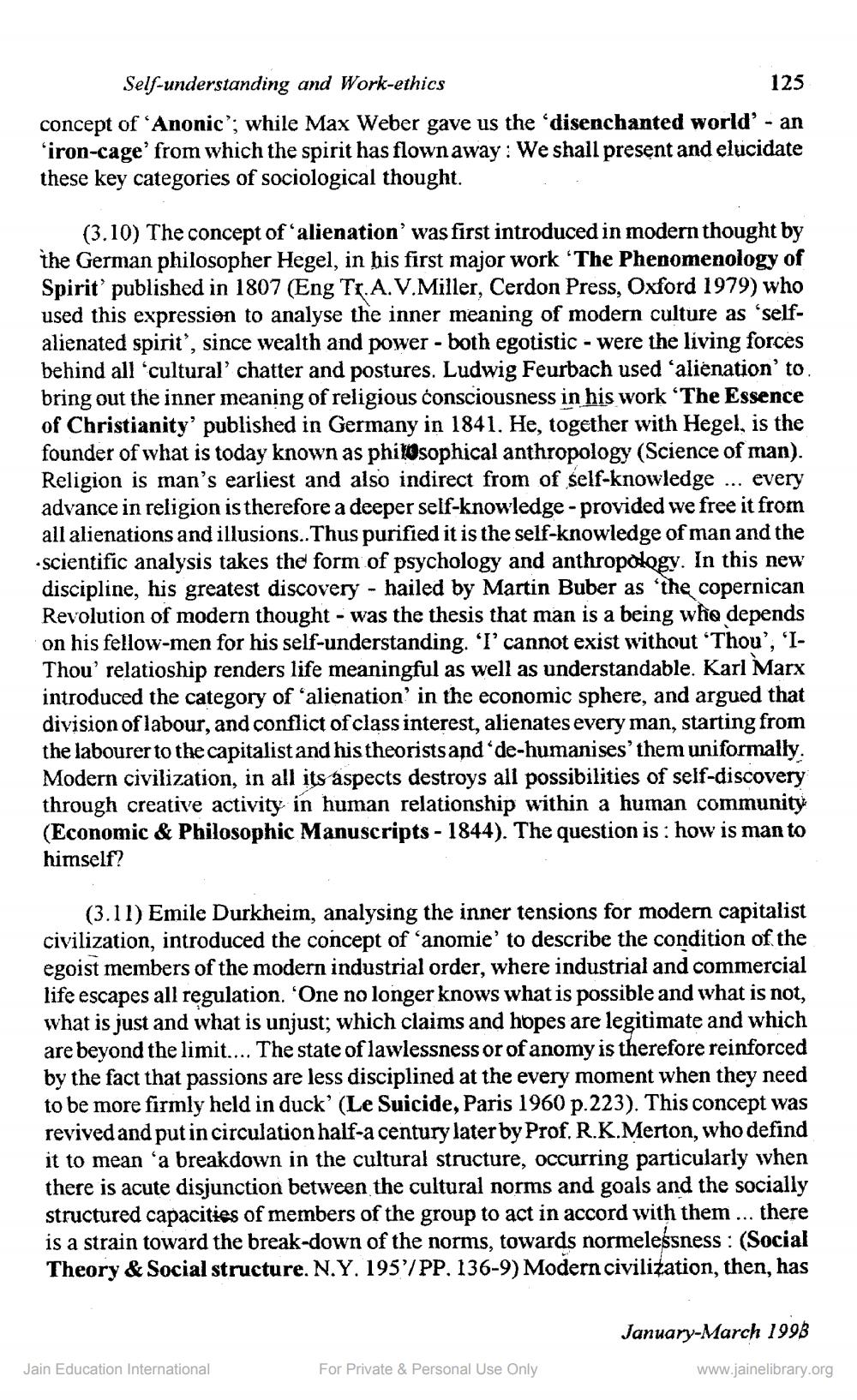________________
Self-understanding and Work-ethics
125
concept of 'Anonic'; while Max Weber gave us the 'disenchanted world' - an 'iron-cage' from which the spirit has flown away: We shall present and elucidate these key categories of sociological thought.
(3.10) The concept of 'alienation' was first introduced in modern thought by the German philosopher Hegel, in his first major work 'The Phenomenology of Spirit' published in 1807 (Eng Tr.A. V.Miller, Cerdon Press, Oxford 1979) who used this expression to analyse the inner meaning of modern culture as 'selfalienated spirit', since wealth and power - both egotistic - were the living forces behind all 'cultural' chatter and postures. Ludwig Feurbach used ‘alienation' to. bring out the inner meaning of religious consciousness in his work 'The Essence of Christianity' published in Germany in 1841. He, together with Hegel, is the founder of what is today known as philosophical anthropology (Science of man). Religion is man's earliest and also indirect from of self-knowledge ... every advance in religion is therefore a deeper self-knowledge - provided we free it from all alienations and illusions.. Thus purified it is the self-knowledge of man and the .scientific analysis takes the form of psychology and anthropology. In this new discipline, his greatest discovery - hailed by Martin Buber as 'the copernican Revolution of modern thought - was the thesis that man is a being who depends on his fellow-men for his self-understanding. 'I' cannot exist without 'Thou', 'IThou' relatioship renders life meaningful as well as understandable. Karl Marx introduced the category of 'alienation' in the economic sphere, and argued that division of labour, and conflict of class interest, alienates every man, starting from the labourer to the capitalist and his theorists and de-humanises' them uniformally. Modern civilization, in all its aspects destroys all possibilities of self-discovery through creative activity in human relationship within a human community (Economic & Philosophic Manuscripts - 1844). The question is: how is man to himself?
(3.11) Emile Durkheim, analysing the inner tensions for modern capitalist civilization, introduced the concept of 'anomie' to describe the condition of the egoist members of the modern industrial order, where industrial and commercial life escapes all regulation. 'One no longer knows what is possible and what is not, what is just and what is unjust; which claims and hopes are legitimate and which are beyond the limit.... The state of lawlessness or of anomy is therefore reinforced by the fact that passions are less disciplined at the every moment when they need to be more firmly held in duck' (Le Suicide, Paris 1960 p.223). This concept was revived and put in circulation half-a century later by Prof. R.K.Merton, who defind it to mean 'a breakdown in the cultural structure, occurring particularly when there is acute disjunction between the cultural norms and goals and the socially structured capacities of members of the group to act in accord with them... there is a strain toward the break-down of the norms, towards normelessness : (Social Theory & Social structure. N.Y. 1957/PP. 136-9) Modern civilization, then, has
Jain Education International
For Private & Personal Use Only
January-March 1993
www.jainelibrary.org




